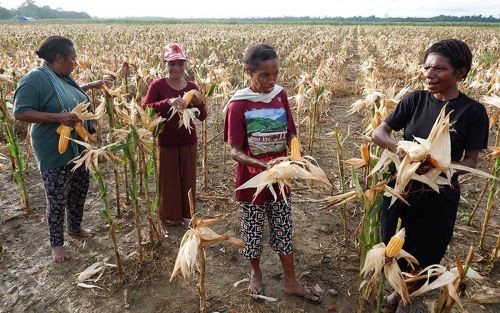Popular Reads
Top Results
Can't find what you're looking for?
View all search resultsPopular Reads
Top Results
Can't find what you're looking for?
View all search resultsPreventing food security agenda from exacerbating climate crisis
Policies that focus solely on food production, without taking a holistic systems approach, will not be sufficient to mitigate the growing threat of hunger caused by climate change.
Change text size
Gift Premium Articles
to Anyone
T
he United Nations Climate Change Conference (COP29) in Baku has been emphasizing the urgent need to move beyond dialogue and implement concrete solutions that bring tangible changes on the ground. One of the key focuses is on strengthening pathways for agrifood systems transformation to make them more sustainable, efficient and resilient in support of global climate targets.
It is well-recognized that the agricultural sector contributes over one third of greenhouse gas emissions, accounts for up to 80 percent of biodiversity loss and consumes approximately 70 percent of freshwater resources. At the same time, climate change is significantly impacting food systems, as rising temperatures, shifting precipitation patterns and extreme weather events make it increasingly challenging to grow crops, thereby threatening the food security of many countries.
In Indonesia, food security has become a key priority under the administration of President Prabowo Subianto. This agenda gained further momentum with the establishment of the Office of the Coordinating Food Minister, tasked with organizing the efforts of ministries and agencies to achieve self-sufficiency and ensure national food security. The inclusion of the Environment Ministry under this new coordinating body has drawn particular attention.
Putting the Environment Ministry under the purview of the coordinating food minister seems to signal a fresh perspective, suggesting that the future food security agenda should be aligned with environmental sustainability. If that interpretation is correct, the approach aligns with the newly introduced global framework by the Food and Agriculture Organization, called “Achieving SDG 2 without Breaching the 1.5C Threshold”, which says transforming agrifood systems through sustainable practices and accelerated climate actions is essential to meeting global food security goals, while also contributing to climate targets without exceeding the critical 1.5-degree-Celsius threshold.
The primary strategy to achieve food security led by the Office of the Coordinating Food Minister focuses on agricultural intensification and extensification. In regions like Java, where expansion is not feasible, intensification efforts are prioritized. Meanwhile, extensification is pursued by developing new farmland or establishing food estates.
However, the centrally dictated food estate concept, which replaces forests and diverse agroecosystems with monoculture plantations, has always raised significant concerns among the public.
Despite the ongoing debate over food estates in the country, during the plenary session of COP29, Indonesia reaffirmed its commitment to continuing the initiative. In line with the development of food estates, it was also mentioned that Indonesia would begin the gradual restoration of over 12 million hectares of forest.



















